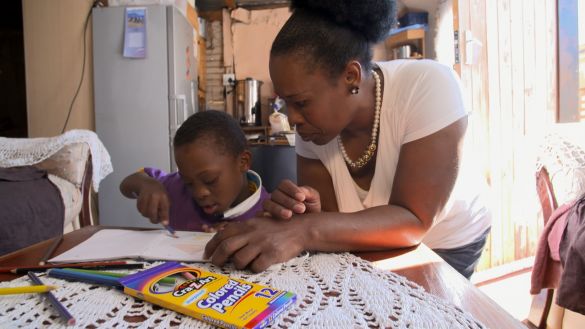Projects | Featured | Siyakwazi Early Childhood Development Programme | The Importance of ECD
Siyakwazi Early Childhood Development Programme
The Importance of ECD
- 28 September 2017
- Rise
- Early Childhood Development, Skills Development

Of every one thousand people living in South Africa (and our population is over 55.91 million), 25 have an IQ between 50 and 80. Yet, we know very little about Intellectual Disability, a subject often plagued by stereotypes, misconception and misunderstanding.
What is Intellectual Disability?
Intellectual Disability is characterised by a low IQ level, significant limitations in intellectual functioning (reasoning, learning and problem solving) as well as the ability to adapt or relate to the surrounding world to the same extent as others. It is usually diagnosed before the age of 18 and is lifelong.
There are various causes of Intellectual Disability however, doctors find a specific reason in only 25% of cases. Some of these causes include chromosomal abnormalities such as Down Syndrome, trauma that occurs before or after birth, malnutrition as well as various childhood diseases such as whooping cough, chicken pox and measles, which may lead to meningitis and encephalitis potentially damaging the brain.
Increased Risk in South Africa
Children growing up in poverty are at higher risk for malnutrition, childhood diseases, exposure to environmental health hazards and often receive inadequate health care. These factors increase the risk of intellectual disability. This is very concerning, considering that 55% of the South African population live in poverty.
In addition to inadequate health care in South Africa, we also have a lack of good quality educational facilities. This year alone, over 40 000 children in Gauteng and Western Cape were rejected from grade 1 as space in public schools is limited. The number of children not attending school is even higher in the rural areas of South Africa. Research suggests that such under-stimulation can result in irreversible damage and can serve as a cause of Intellectual Disability.
Thus, the importance of Early Childhood Development (ECD) cannot be stressed enough. Although ECD can’t cure Intellectual Disabilities, it provides children with Intellectual Disabilities with the ability to learn. Stimulating children with Intellectual Disabilities is very important as it encourages learning, prepares them and gives them better prospects for the future.
Unfortunately, 47% of children aged 0 – 6 do not receive early childhood learning according to the Statistician-General’s report.
 Rise is proud to have partnered with Siyakwazi, an NPO that provides ECD programmes to the community of the Ugu District in KZN. Siyakwazi’s programme assists schools and ECD Centres by adding resources to their pool in the form of their trained volunteers, known as Siyasizas. The Siyasiza’s role is to help identify children with barriers to learning, manage inclusive learning programmes for the children, bring new knowledge and tools to the learning environment and encourage awareness amongst parents regarding their children’s milestones and learning.
Rise is proud to have partnered with Siyakwazi, an NPO that provides ECD programmes to the community of the Ugu District in KZN. Siyakwazi’s programme assists schools and ECD Centres by adding resources to their pool in the form of their trained volunteers, known as Siyasizas. The Siyasiza’s role is to help identify children with barriers to learning, manage inclusive learning programmes for the children, bring new knowledge and tools to the learning environment and encourage awareness amongst parents regarding their children’s milestones and learning.
Corporates are invited to take part in the programme through funding an Early Childhood Development Learnership. This will provided corporates with a valuable opportunity to gain points under the Skills Development element of the B-BBEE Scorecard, while simultaneously empowering Siyasizas and building their knowledge to assist children and parents in the community.
